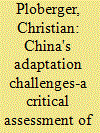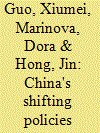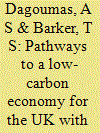|
|
|
Sort Order |
|
|
|
Items / Page
|
|
|
|
|
|
|
| Srl | Item |
| 1 |
ID:
124164


|
|
|
|
|
| Publication |
2013.
|
| Summary/Abstract |
China's reform/opening process has been exceptionally successful at generating lasting economic growth and in lifting millions of people out of absolute poverty. However, this success came at a significant price. Environmental degeneration represents one critical issue. Other serious topics include an increasing income and development gap between and within provinces, and between rural and urban areas. A proposed shift towards a low-carbon economy seems to provide an answer in addressing this complex environmental-development challenge. However, decisions on a future course of action are not made in a political, economic or social vacuum, instead decisions are made in the context of a particular structural environment, which restricts the options available for actors. Applying a structure-agency approach will help to identify and highlight the existing structural challenges inherent within China's development strategy.
|
|
|
|
|
|
|
|
|
|
|
|
|
|
|
|
| 2 |
ID:
120814


|
|
|
|
|
| Publication |
2013.
|
| Summary/Abstract |
China is currently not only the most populous country on earth, but also the world's largest greenhouse gas (GHG) emitter. As China's population growth continues contributing to the overall global population increase, the country remains a significant player in the global problems related to climate change. The Chinese government, however, has recognized that a low-carbon economy is in the country's long-term economic and social interests and this is now a key part of its national development strategy. This paper examines the evolution of policies for sustainability in China and explores their compositions, functions and operational mechanisms. Some emerging features and trends in China's development model are examined, arguing that they represent a clear shift towards sustainability. Further problems and challenges associated with this change and how they impact on China's policies and strategies are also discussed.
|
|
|
|
|
|
|
|
|
|
|
|
|
|
|
|
| 3 |
ID:
096145


|
|
|
|
|
| Publication |
2010.
|
| Summary/Abstract |
This paper examines different carbon pathways for achieving deep CO2 reduction targets for the UK using a macro-econometric hybrid model E3MG, which stands for Energy-Economy-Environment Model at the Global level. The E3MG, with the UK as one of its regions, combines a top-down approach for modeling the global economy and for estimating the aggregate and disaggregate energy demand and a bottom-up approach (Energy Technology subModel, ETM) for simulating the power sector, which then provides feedback to the energy demand equations and the whole economy. The ETM submodel uses a probabilistic approach and historical data for estimating the penetration levels of the different technologies, considering their economic, technical and environmental characteristics. Three pathway scenarios (CFH, CLC and CAM) simulate the CO2 reduction by 40%, 60% and 80% by 2050 compared to 1990 levels respectively and are compared with a reference scenario (REF), with no reduction target. The targets are modeled as the UK contribution to an international mitigation effort, such as achieving the G8 reduction targets, which is a more realistic political framework for the UK to move towards deep reductions rather than moving alone. This paper aims to provide modeling evidence that deep reduction targets can be met through different carbon pathways while also assessing the macroeconomic effects of the pathways on GDP and investment.
|
|
|
|
|
|
|
|
|
|
|
|
|
|
|
|
| 4 |
ID:
125669


|
|
|
|
|
| Publication |
2013.
|
| Summary/Abstract |
Using the latest available data, this brief article attempts to provide the first regional decomposition analysis of CO2 emissions from fuel combustion. Covering eight regions of the world, determinants are estimated in relative and absolute terms for the period 1971-2010. We use the unparalleled 2010 global surge in CO2 emissions as a reference and entry point for the analysis. Overall, results show that most regions have recently performed worse than their historical trends and lack of meaningful progress is identified. Whereas specific drivers for certain regions suggest some level of continuous improvement (e.g. reduced energy intensity in Asia, decarbonisation of of energy supply in OECD Europe), they are incapable of offsetting the effects of economic growth and increased energy use. With the exception of Africa, most regions appear to have missed the 'low-carbon economy opportunity' provided by the 2008-2009 global financial crisis. Results suggest a lack of serious environmental effectiveness of regional policy portfolios aiming at reducing CO2 emissions. Highly ambitious energy efficiency and renewable energy policies across all regions are immediately needed. Additionally, absolute reductions in energy use from fossil fuels and resulting CO2 emissions are urgently required in rich regions if we are to align production and consumption patterns with maintaining global warming below the 2 °C threshold.
|
|
|
|
|
|
|
|
|
|
|
|
|
|
|
|
|
|
|
|
|